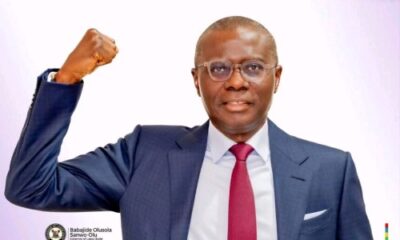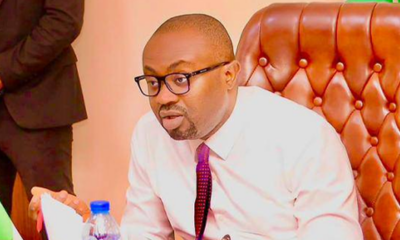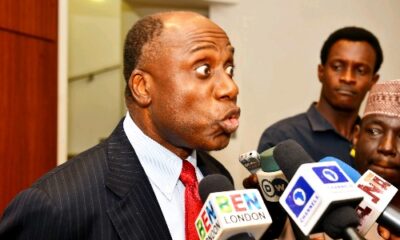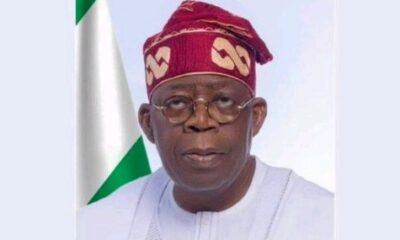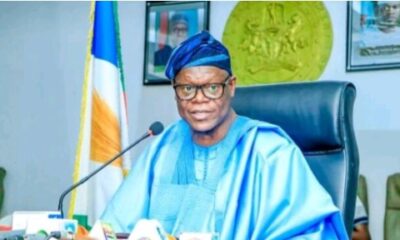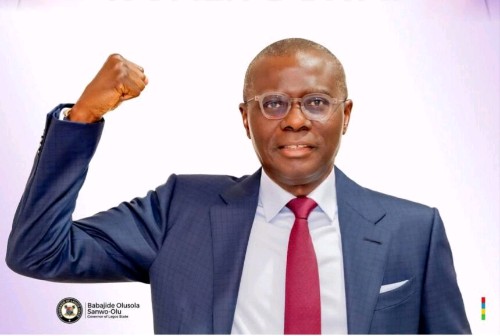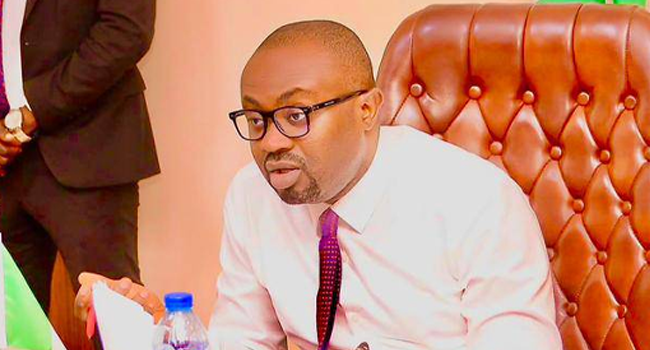Renowned author and biographer, Dr. Lanre Alfred, has unveiled a significant new title, “The Man Who Carried a City”, an in-depth literary biography of Lagos State Governor, Mr. Babajide Olusola Sanwo-Olu. The launch of the book serves as a heartfelt celebration of the governor’s upcoming 60th birthday on June 25, 2025.
Recognized for his elegant prose and detailed chronicling of modern Nigerian leadership, Alfred, popularly known as the “Doctor of Letters”, presents another impactful narrative of resilience shaped by vision. This latest release is his eighth publication, adding to his impressive catalogue which includes The Titans…The Amazing Exploits of Nigeria’s Greatest Achievers, Pacemaker – Triumphs of Igho Sanomi at 40, and Dapo Abiodun: The State House As His Pulpit.
Nigeria At 60’, Highlife – Amazing Lifestyles of Nigeria’s Rich and Famous, The Lion of Afia Nsit -Triumphs of Scott Tommey at 45; and Julius Rone…The Jewel of the Delta. Nigeria @ 65 etc.
In “The Man Who Carried a City,” Alfred offers a detailed portrayal of Sanwo-Olu’s career in public service, tracking his journey from early influences to his current role as the leader of Nigeria’s most dynamic state. The coffee table book, published by Old English Partners, features fourteen chapters spread across more than 250 glossy, full-color pages, brought to life with striking photography and Alfred’s signature poetic writing style.
The opening chapter, “The Clockmaker’s Spawn,” explores Sanwo-Olu’s background and the early forces that shaped him, creatively linking the discipline of timekeeping to his methodical and structured approach to leadership. Another notable section, “Lagos in His Lungs,” delves into Sanwo-Olu’s deep connection with the city, illustrating how his personal and professional life is intricately aligned with the rhythm of Lagos.
In “The Politics of Listening,” Alfred portrays Sanwo-Olu not just as a leader issuing orders, but as a servant of the people, in tune with public needs and translating those into governance. Other insightful chapters include “His Tailored Creed”, which connects his fashion choices to his administrative philosophy; “2020… The Year Lagos Trembled”, which examines his leadership during the pandemic and #EndSARS protests; and “Legacy as a Living Covenant,” a reflection on the future of Lagos under his watch.
The foreword, written by Olawale Olaleye, Deputy Editor at ThisDay newspaper, affirms the depth of Alfred’s work. In a piece titled “His Burden of Grace”, Olaleye praises the biography as “probing and profound,” noting that “Dr. Alfred’s book has not only done justice to the leadership of Sanwo-Olu as he steps into the sixth floor on June 25th, 2025, it has also done so without taking anything away from the truth of the accounts of his stewardship thus far.”
Olaleye further reflects, “From one crisis to another, Governor Sanwo-Olu has experienced such hard-to-believe baptism of fire in the last seven years… Yet, he has taken his travails of leadership with equanimity and rare grace, a quality that sets him apart and establishes a different standard for whomever eventually succeeds him.”
Dr. Lanre Alfred explained that writing “The Man Who Carried a City” was more than a literary project; it was a personal homage to a leader whose approach stands in contrast to the usual noise of politics, offering steady and sincere service to the people. According to Alfred, “Governor Babajide Sanwo-Olu is not simply a public servant. He is a civic artisan, meticulous, selfless, and deeply humane. He governs with empathy, listening more than he speaks, and building more than he boasts.”
He added, “In today’s world where leadership is often reduced to spectacle, Sanwo-Olu exemplifies a different path — one of humility and substance. He has mastered the rare skill of being genuinely present for the people without seeking attention. This book aims to preserve that unique ethos of governance.”
Alfred pointed out Nigeria’s failure to preserve the legacies of genuine public servants, calling it a serious shortcoming in national consciousness. He said, “One of the great failings of our nation is our inability to document the journeys of those who have truly served. Nigeria is poor not for lack of heroes, but for lack of memory. We do not archive greatness when it blooms among us; we let it wither in silence. I wrote this book because Sanwo-Olu’s story—his sacrifices, his vision, his silent triumphs—must not be left to the mercy of rumour or forgetfulness.”
For Alfred, the legacy of the governor is more than physical infrastructure — it lies in the calm strength of a man who carried Lagos through intense trials, including the darkest periods of 2020, while also pushing for the city’s renewal. “It would be unjust to history,” he said, “to let such a profound burden of grace pass undocumented.”
To him, the book is not just a birthday memento; it represents a meaningful civic effort. He sees “The Man Who Carried a City” as a guiding document for both young people and current leaders in a time that desperately needs authentic role models.
The biography highlights Sanwo-Olu’s accomplishments in areas such as infrastructure, social welfare, crisis response, and cultural revival, while also painting a vivid picture of the man behind the political role. In the chapter “Ibijoke”, Alfred takes a closer look at the First Lady, emphasizing the strength and partnership between the couple as a foundational part of Sanwo-Olu’s life, portraying love as both support and legacy.
The book concludes with the section “Sixty Portraits in a Single Soul”, summarizing Sanwo-Olu’s six-decade-long journey of service and dedication into a visual and narrative tribute that echoes not only his personal story but the spirit of Lagos itself.
Looking ahead, “The Man Who Carried a City” serves as both a reflection of past leadership challenges and a guide for future city-bearers who aspire to lead with purpose and resilience.

 BIG STORY5 days ago
BIG STORY5 days ago
 BIG STORY5 days ago
BIG STORY5 days ago
 BIG STORY4 days ago
BIG STORY4 days ago
 BIG STORY4 days ago
BIG STORY4 days ago
 BIG STORY3 days ago
BIG STORY3 days ago
 BIG STORY4 days ago
BIG STORY4 days ago
 BIG STORY4 days ago
BIG STORY4 days ago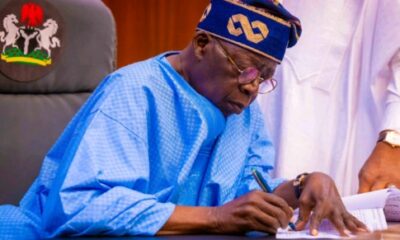
 BIG STORY3 days ago
BIG STORY3 days ago









